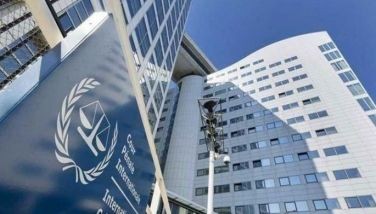PCGG eyes treaty in Marcos loot recovery
August 3, 2002 | 12:00am
A month-old treaty between the Philippines and Switzerland may be the key for the government to recover billions in dollars of Marcos money from various Swiss banks.
Chairman Haydee Yorac of the Presidential Commission on Good Government (PCGG) said yesterday they are trying to find out if the Mutual Legal Assistance Treaty (MLAT) could help the government strengthen its claim on the Marcos funds.
"But we are studying the treaty very closely for the purpose of using it to recover the ill-gotten wealth of the Marcoses," she said.
Yorac said the PCGG would like to know if the MLAT could be retroactively applied to allow them to search for the Marcos money without violating Swiss law.
"We don’t know how MLAT could help us," she said. "We want to know if it will make the (recovery) procedures will be better or simpler."
The Senate and the Swiss Parliament have yet to ratify the MLAT and two other treaties before they could be binding on the two countries.
In signing the three pacts, the Philippine and Swiss governments intended to jointly fight money laundering, terrorism and other transnational crimes.
Switzerland’s strict bank secrecy law has barred the Philippines from getting the cooperation of Swiss banks in tracking down the Marcos funds.
The PCGG believes the late President Ferdinand Marcos has stashed away in different Swiss banks between $5 and 10 billion in stolen money.
Yorac said the PCGG has already recovered $2 billion in Marcos funds following litigation or settlement with various cronies of the late strongman.
"I know that justice is very slow in this country but it cannot be that slow," she said.
Yorac said she is now focusing on the three most important of about 700 civil cases, including one that involves funds which the government insists were made up of taxes collected from coconut farmers during the Marcos regime.
"With respect to the coco levy funds, and with respect to the monies deposited in the name of five or six Swiss foundations in Switzerland, I’m giving you a timetable between end of the year, up to the middle of next year," she said.
The sequestered United Coconut Planters Bank manages the so-called "coco levy funds," which controls a 27-percent stake in the food giant San Miguel Corporation.
Marcos and his family also allegedly salted away $70 million and deposited these in various numbered bank accounts in Switzerland.
On orders of the Swiss Supreme Court, these funds are now in an escrow account in a bank in Metro Manila, awaiting a final judicial ruling on their ownership.
Meanwhile, Yorac said she found out to her horror that the PCGG’s records "were in complete disarray" with "many documents" vital to the cases "found to be missing."
Yorac said they were surprised last year when some of the missing documents turned up at the house of a former PCGG commissioner.
The PCGG is studying the criminal liability of the former official, Yorac added.–Sheila Crisostomo
Chairman Haydee Yorac of the Presidential Commission on Good Government (PCGG) said yesterday they are trying to find out if the Mutual Legal Assistance Treaty (MLAT) could help the government strengthen its claim on the Marcos funds.
"But we are studying the treaty very closely for the purpose of using it to recover the ill-gotten wealth of the Marcoses," she said.
Yorac said the PCGG would like to know if the MLAT could be retroactively applied to allow them to search for the Marcos money without violating Swiss law.
"We don’t know how MLAT could help us," she said. "We want to know if it will make the (recovery) procedures will be better or simpler."
The Senate and the Swiss Parliament have yet to ratify the MLAT and two other treaties before they could be binding on the two countries.
In signing the three pacts, the Philippine and Swiss governments intended to jointly fight money laundering, terrorism and other transnational crimes.
Switzerland’s strict bank secrecy law has barred the Philippines from getting the cooperation of Swiss banks in tracking down the Marcos funds.
The PCGG believes the late President Ferdinand Marcos has stashed away in different Swiss banks between $5 and 10 billion in stolen money.
Yorac said the PCGG has already recovered $2 billion in Marcos funds following litigation or settlement with various cronies of the late strongman.
"I know that justice is very slow in this country but it cannot be that slow," she said.
Yorac said she is now focusing on the three most important of about 700 civil cases, including one that involves funds which the government insists were made up of taxes collected from coconut farmers during the Marcos regime.
"With respect to the coco levy funds, and with respect to the monies deposited in the name of five or six Swiss foundations in Switzerland, I’m giving you a timetable between end of the year, up to the middle of next year," she said.
The sequestered United Coconut Planters Bank manages the so-called "coco levy funds," which controls a 27-percent stake in the food giant San Miguel Corporation.
Marcos and his family also allegedly salted away $70 million and deposited these in various numbered bank accounts in Switzerland.
On orders of the Swiss Supreme Court, these funds are now in an escrow account in a bank in Metro Manila, awaiting a final judicial ruling on their ownership.
Meanwhile, Yorac said she found out to her horror that the PCGG’s records "were in complete disarray" with "many documents" vital to the cases "found to be missing."
Yorac said they were surprised last year when some of the missing documents turned up at the house of a former PCGG commissioner.
The PCGG is studying the criminal liability of the former official, Yorac added.–Sheila Crisostomo
BrandSpace Articles
<
>
- Latest
- Trending
Trending
Latest
Trending
Latest
Recommended
































